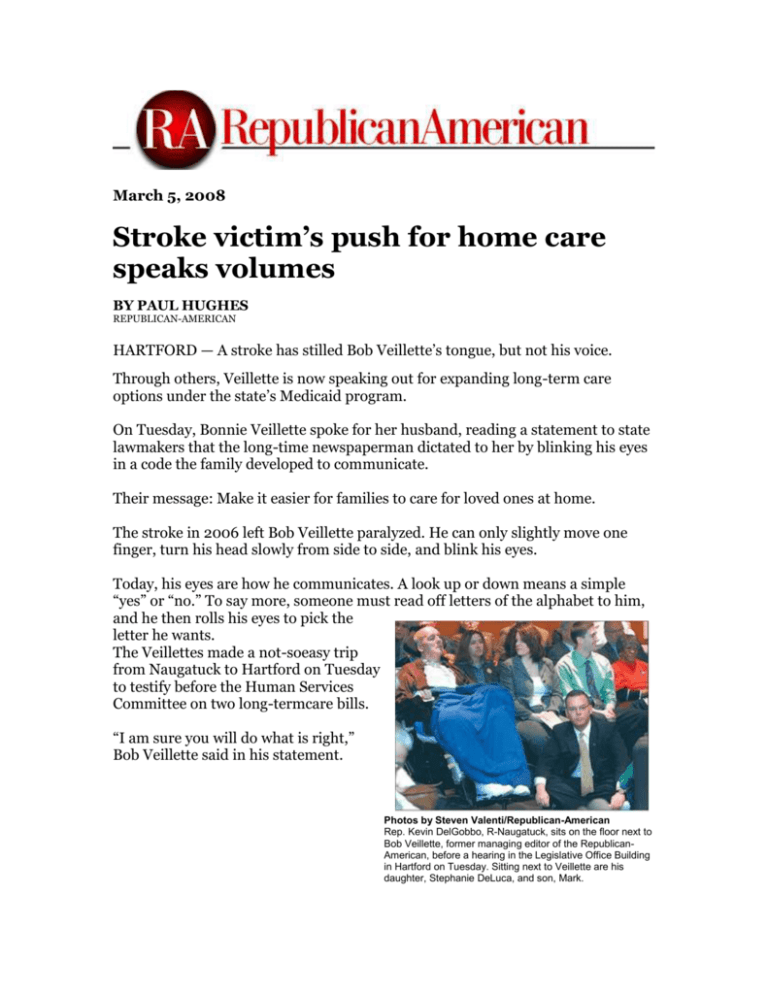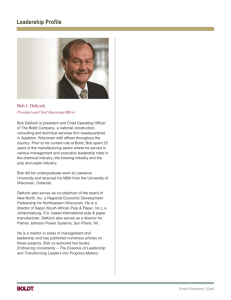Jessica Hill/Associated Press
advertisement

March 5, 2008 Stroke victim’s push for home care speaks volumes BY PAUL HUGHES REPUBLICAN-AMERICAN HARTFORD — A stroke has stilled Bob Veillette’s tongue, but not his voice. Through others, Veillette is now speaking out for expanding long-term care options under the state’s Medicaid program. On Tuesday, Bonnie Veillette spoke for her husband, reading a statement to state lawmakers that the long-time newspaperman dictated to her by blinking his eyes in a code the family developed to communicate. Their message: Make it easier for families to care for loved ones at home. The stroke in 2006 left Bob Veillette paralyzed. He can only slightly move one finger, turn his head slowly from side to side, and blink his eyes. Today, his eyes are how he communicates. A look up or down means a simple “yes” or “no.” To say more, someone must read off letters of the alphabet to him, and he then rolls his eyes to pick the letter he wants. The Veillettes made a not-soeasy trip from Naugatuck to Hartford on Tuesday to testify before the Human Services Committee on two long-termcare bills. “I am sure you will do what is right,” Bob Veillette said in his statement. Photos by Steven Valenti/Republican-American Rep. Kevin DelGobbo, R-Naugatuck, sits on the floor next to Bob Veillette, former managing editor of the RepublicanAmerican, before a hearing in the Legislative Office Building in Hartford on Tuesday. Sitting next to Veillette are his daughter, Stephanie DeLuca, and son, Mark. The former managing editor of the Republican-American offered some heartfelt words of advice to committee members with a twinge of his trademark humor. “May I offer three pieces of personal advice for all of you,” Bonnie Veillette said, reading from her husband’s statement. “Stay with loved ones at home if circumstances allow. No. 2, plan now. No. 3, take nothing for granted. No. 4, count your blessings. OK, he said, that is four, and he quipped, I failed math.” The Veillettes urged passage of legislation to expand a new home-care program and to set up a clearinghouse for information on long-term-care options. One of the couple’s two sons and their daughter also testified Tuesday. “My dad, Bob Veillette, has fallen through the cracks of the current Medicaid program since his stroke in 2006. I am certain he is not alone,” daughter Stephanie DeLuca said. The Veillette family is backing legislation that would allow patients to use Medicaid funding for less expensive home care rather than more expensive nursing home care. The legislature approved the state’s participation last year in a new federal grant program that is aimed at moving people out of institutional long-term care. The legislation last year required the Department of Social Services to serve 700 participants through a pilot project in five years. However, the department has yet to get the demonstration project up and running. There are proposals to expand the number of slots to 5,000, set up a trust fund to finance the program and eliminate a requirement that participants have to spend six months in a nursing home to qualify. One of the activists backing the changes is Joe Stango, a financial analyst from Southbury who mounted a grassroots push for more home-care options under Medicaid in Connecticut. Joseph Stango is working with the Veillettes on their effort. “The reality is when we find a family like the Veillettes who want to take care of each other, who want to help each other, we need to hold those families up as an example,” Stango said. “We need to embrace them, we need to help them in their efforts to help each other, and, above all, we need to say to society, ‘This is what families do. This is how they act.’ Our policies for Medicaid do the exact opposite. We encourage families to break up.” On Tuesday, Bonnie Veillette and her children recounted the family’s travails since the stroke. “We put three children through college and were looking forward to retirement, and, in one brief moment, it was gone,” Bonnie Veillette told the Human Services Committee. The massive brain stem stroke left Bob Veillette in what is known as “locked-in syndrome,” a rare condition that affects an estimated 25,000 to 35,000 people in the United States. The 63-year-old Veillette is a complete quadriplegic. He must use a feeding tube because he cannot swallow. He cannot speak. “He is dependent for all his needs, and he describes this as a haunting nightmare,” Bonnie Veillette said. “What has happened to my dad and consequently our family would fall into a category of events that can only be described by words like catastrophic, unfair, devastating, tragic and unplanned,” said son Greg Veillette, a doctor living in Boston. After the stroke, Bob Veillette spent six months in hospitals. The family looked for nursing homes, but found no suitable one that would take such a medically challenged person. They decided to continue his care at home. Medicaid paid $9,000 a week for his care in a rehabilitation hospital. He could have continued to stay there, or Medicaid would have paid approximately $10,000 a month for a nursing home. But once her husband came home in October 2006, Bonnie Veillette said, the Medicaid payments stopped. The family paid all his expenses while they waited 16 months to get him accepted into a special home-care program. The acceptance came in January, but the family continues to pay thousands of dollars each month in care-related expenses. Bob and Bonnie Veillette are now living on his pension, Social Security and money friends and family help to raise. Home is where the Veillettes are determined to stay. “We know we are going to be home as long as we can do it,” Bonnie Veillette told the Human Services Committee. *** Veillette’s statement Unable to speak, Bob Veillette communicates by blinking his eyes in a code the family developed. In the photo at left, his wife, Bonnie, reads a statement from her husband to lawmakers on the Human Services Committee during Tuesday’s hearing: Dear committee members, Thank you for your time, dedication and especially looking out for us. I support Joe Stango’s push for the bills. I am sure you will do what is right. May I offer three pieces of personal advice for all of you. Stay with loved ones at home if circumstances allow. No. 2, plan now. No. 3, take nothing for granted. No. 4, count your blessings. OK, he said, that is four, and he quipped, I failed math. With gratitude, Bob Veillette Copyright (c) 2008 Republican-American 03/05/2008







